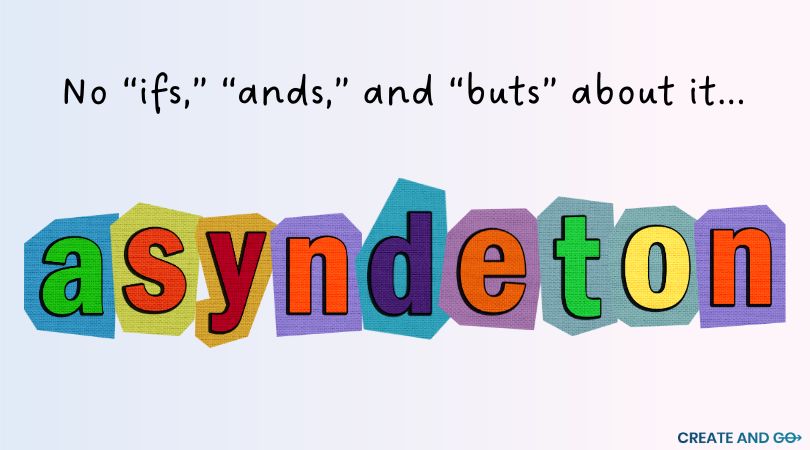Hey there, fabulous wordsmiths! It’s time to add some sizzle and pop to your writing with a dash of asyndeton examples.
This snazzy literary device can supercharge your sentences, amp up your articulation, and give your prose that extra sparkle.
More specifically, it can empower your writing with an unprecedented sense of urgency, rhythm, and emphasis.
It’s a technique often overlooked, yet it’s employed by some of the greatest wordsmiths – Shakespeare, Hemingway, and more
Not familiar with asyndeton? Don’t sweat it!
In this post, we’ll share the asyndeton definition, how to use it effectively in your writing, and some examples to inspire your writing journey.
Whether you’re an aspiring author, a seasoned novelist, or a curious reader, this exploration of asyndeton is guaranteed to add a touch of literary flair to your writing or reading experience.
What is Asyndeton?

Asyndeton is a literary device that involves the omission of conjunctions, such as “and,” “but,” and “or,” in a series of words, phrases, or clauses.
This intentional lack of conjunctions creates a sense of urgency, immediacy, and intensity in writing.
Asyndeton can also add emphasis to each item in the list by separating them and making them stand out on their own.
For example, compare the following sentences:
- I came, I saw, I conquered.
- I came, and I saw, and I conquered.
Without the conjunctions in the first sentence, each action is given equal importance and emphasizes the speaker’s confidence and determination.
In contrast, the second sentence with conjunctions feels more mundane and less impactful.
How to Use Asyndeton
Now that you understand the definition, let’s explore how to use asyndeton effectively in your writing.
- Emphasize a Point: Use asyndeton to emphasize a key point or idea by removing conjunctions and creating a sense of urgency and importance.
- Create Rhythm: Asyndeton can also add rhythm and flow to your writing by removing the pauses that conjunctions create. It can make your prose feel more dynamic and energetic.
- Vary Sentence Structure: Asyndeton also adds variety to sentence structure, making your writing more engaging and less predictable for readers.
- Show a Character’s Thoughts: In dialogue or internal monologue, using asyndeton can give insight into a character’s thoughts and emotions. It can convey a sense of haste, excitement, or even panic.
- Use it Sparingly: Asyndeton is most effective when used sparingly for impact. Overusing it can make your writing feel choppy or disjointed.
25 Asyndeton Examples
Examples of asyndeton can be found in literature, speeches, song lyrics, and everyday conversation.
Examples of Asyndeton in Literature

- “I came, I saw, I conquered.” – Julius Caesar by William Shakespeare
- “Friends, Romans, countrymen, lend me your ears.” – Julius Caesar by William Shakespeare
- “It was the best of times, it was the worst of times.” – A Tale of Two Cities by Charles Dickens
- “We shall not flag or fail. We shall go on to the end.” – The Unabridged Journals of Sylvia Plath by Sylvia Plath
- “To strive, to seek, to find, not to yield.” – Ulysses by Alfred Lord Tennyson
- “Life, liberty, happiness – these are the pursuits of humankind.” – Common Sentiments by Kathryn Adams
- “He was a bag of bones, a floppy doll, a broken stick, a maniac.” – The English Patient by Michael Ondaatje
- “She opened the door, walked in, switched on the light.” – The Tortoise and the Hare by Elizabeth Jenkins
- “The wind whispered, the trees swayed, the leaves rustled.” – The Adventures of Tom Sawyer by Mark Twain
- “I came alone, I leave alone.” – Of Mice and Men by John Steinbeck
Asyndeton Examples in Speeches

- “We shall fight on the beaches, we shall fight on the landing grounds, we shall fight in the fields and in the streets.” – Winston Churchill’s “We Shall Fight on the Beaches” speech
- “We are caught in an inescapable network of mutuality, tied in a single garment of destiny.” – Martin Luther King Jr.’s “Letter from Birmingham Jail”
- “I will fight for my country, I will defend its freedom, and I will sacrifice my life if necessary.” – Mahatma Gandhi’s Quit India speech
- “Ask not what your country can do for you, ask what you can do for your country.” – John F. Kennedy’s Inaugural Address
- “We shall never surrender.” – Winston Churchill’s “Their Finest Hour” speech
- “Government of the people, by the people, for the people, shall not perish from the earth.” – Abraham Lincoln’s Gettysburg Address
- “We will not walk in fear, one of another.” – Edward R. Murrow speech
- “We shall pay any price, bear any burden, meet any hardship, support any friend, oppose any foe.” – John F. Kennedy’s Inaugural Address
- “I have nothing to offer but blood, toil, tears, sweat.” – Winston Churchill’s First Speech as Prime Minister
- “We will not flag, we will not fail. We’ll fight in the fields, in the streets, in the hills.” – Winston Churchill’s speech to the House of Commons
Examples of Asyndeton in Song Lyrics

- “I came, I saw, I conquered, I balled.” – Rap God by Eminem
- “I’m like a bird, I’ll only fly away.” – I’m Like a Bird by Nelly Furtado
- “I want that red velvet, I want that sugar sweet.” – Wildest Dreams by Taylor Swift
- “I want it all, I want nothing at all.” – All or Nothing by Smallpools
- “You and me, we got this king of love.” – You and Me by The Plain White T’s
- “Work it, make it, do it, makes us harder, better, faster, stronger.” – Harder, Better, Faster, Stronger by Daft Punk
- “I walk a lonely road, the only one that I have ever known.” – Boulevard of Broken Dreams by Green Day
- “I came in like a wrecking ball, I never hit so hard in love.” – Wrecking Ball by Miley Cyrus
Asyndeton Examples in TV and Film

- “No food, no water, nothing but sand.” – Mad Max: Fury Road
- “Love is patient, love is kind.” – A Walk to Remember
- “No rules, no parents!” – Home Alone
- “Fast cars, loose women, high-tech gadgets.” – James Bond series
- “A martini. Shaken, not stirred.” – James Bond series
- “I’m just a girl, standing in front of a boy, asking him to love her.” – Notting Hill
- “You jump, I jump.” – Titanic
- “Life is like a box of chocolates, you never know what you’re gonna get.” – Forrest Gump
Examples of Asyndeton in Quotes and Proverbs

Because asyndeton is often used in short phrases, you will find a lot of it in quotes and proverbs.
- “Live, laugh, love.”
- “Work hard, play hard.”
- “Eat, pray, love.”
- “Buy now, pay later.”
- “Think big, dream bigger.”
- “Hear no evil, see no evil, speak no evil.”
- “Aim high, shoot for the stars.”
- “Easy come, easy go.”
Asyndeton is just one of many literary devices you can use to make your writing more impactful and engaging. Here are a few others to consider:
- Alliteration: Repetition of initial consonant sounds, such as “Peter Piper picked a peck of pickled peppers.”
- Metaphor: Comparison between two unlike things without using “like” or “as”, such as “Life is a rollercoaster.”
- Simile: Comparison between two unlike things using “like” or “as”, such as “She sings like an angel.”
- Hyperbole: Exaggeration for emphasis, such as “I’m so hungry I could eat a horse.”
- Personification: Giving human qualities to non-human things, such as “The flowers danced in the wind.”
- Onomatopoeia: Words that imitate the sounds they represent, such as “buzz” or “hiss.”
- Irony: Saying one thing but meaning the opposite, often for humor or sarcasm.
- Imagery: Using vivid language to create mental images for readers, such as “The sun cast a warm glow over the golden fields.”
Remember, creativity knows no bounds when it comes to expressing yourself through words!
FAQs About Asyndeton
Conclusion on Asyndeton Examples
Asyndeton is a powerful rhetorical device that is used to create emphasis and impact in writing.
By removing conjunctions, the writer forces the reader to pause and consider each individual item or idea being presented.
This technique can be seen in various forms of literature, speeches, and even everyday communication.
In this document, we have explored different asyndeton examples in various contexts, including speeches, song lyrics, TV and film, and quotes and proverbs.
Hopefully, this has helped you gain a better understanding of the power of asyndeton in writing.
So go ahead and experiment with it in your own writing to create more impactful and memorable sentences! Keep reading, keep learning, keep creating!